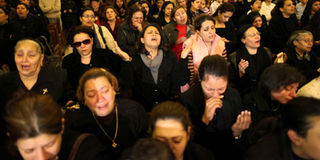Egypt prepares to bury Coptic Pope Shenuda III

Egyptian Christian Copts mourn the death of Pope Shenuda III the spiritual leader of the Middle East's largest Christian minority, at the Saint Mark Coptic cathedral in Cairo's al-Abbassiya district on March 17, 2012. They were preparing March 20, 2012 to bury Pope Shenuda III, who died at the weekend at the age of 88. AFP
Egypt's Coptic Christians were preparing on Tuesday to bury Pope Shenuda III, who died at the weekend at the age of 88, leaving behind his flock of decades full of anxiety over rising Islamism.
A solemn funeral service was scheduled to begin at 11:00 AM (0900 GMT) in Cairo's St Mark's Cathedral before the body is flown to St Bishoy monastery in the Nile Delta, where Shenuda had asked to be buried.
Flags will be flown at half mast and an "unprecedented" security plan has been put in place in the capital and in Beheira province where the 4th century monastery is located, a security official told AFP.
Shenuda's death on Saturday brought tens of thousands of Copts to the cathedral in central Cairo to bid farewell to the leader of the Middle East's largest Christian community.
The body of Shenuda, dressed in gold, white and crimson robes, a gilded crown on his head, was sat upright on the ornate papal throne, a carved image of Christ behind him and lions standing guard on either side.
Devastated worshippers thronged to catch a final glimpse of "Baba Shenuda," using their mobile phones to take pictures of him.
Three mourners were crushed to death in the crowd on Sunday, and 137 people injured, prompting church officials to cut short the viewing and close the cathedral to the public.
But grief-stricken Copts continued to mass outside, and thousands are expected to turn out for the funeral and the burial.
Only those with formal invitations will be allowed into the cathedral, state media reported.
Shenuda's death after a long illness set in motion the process to elect a new patriarch, who will lead the community through a critical phase marked by political instability and ongoing clashes between Copts and Muslims.
The new pope will be chosen by a council made up of senior clergy, current and former Coptic public officials, MPs, local councillors and journalists, in a process that could take months.
News of Shenuda's death caused dismay among Egypt's beleaguered Coptic population, many of whom credited him with maintaining a cool head during challenging times and helping to prevent widespread sectarian unrest.
But his critics saw him as being too close to the government, refusing to speak up for the community in the face of sectarian attacks, discrimination and harassment.
Named pope of Alexandria in 1971, Shenuda led the Copts, estimated at 10 percent of Egypt's population of 80 million, for the best part of a generation. During that time, Egypt was hit by a wave of Islamist militancy from which he sought to protect his people.
Copts have been particularly concerned since Islamist parties, including ultra-conservative Salafists who believe Christians should not rule the country and won almost three-quarters of the seats in the first parliamentary elections since president Hosni Mubarak was ousted in a popular uprising.




